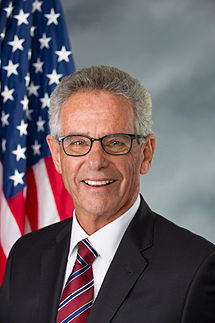Rep. Alan Lowenthal (D-Long Beach) joined the other ranking members of the House of Representatives Committee on Natural Resources and Financial Services in sending a letter to the Securities and Exchange Commission (SEC) seeking a review of the financial disclosures of publicly traded oil and gas exploration companies operating in the Outer Continental Shelf.
 The letter comes as the federal government has approved Shell’s exploration drilling in the Chukchi Sea, in the Arctic. It requests that the SEC “assess the need for additional financial disclosure of publicly traded oil and gas exploration companies operating in the Outer Continental Shelf, and in particular in the Arctic Ocean, and provide us with an explanation and justification for the status quo or further disclosure,” according to a release issued today.
The letter comes as the federal government has approved Shell’s exploration drilling in the Chukchi Sea, in the Arctic. It requests that the SEC “assess the need for additional financial disclosure of publicly traded oil and gas exploration companies operating in the Outer Continental Shelf, and in particular in the Arctic Ocean, and provide us with an explanation and justification for the status quo or further disclosure,” according to a release issued today.
“Full disclosure of risk is essential to good decision-making by the public and without it our markets cannot function properly,” Rep. Lowenthal said in a statement. “I am concerned that oil and gas companies may not be disclosing their full risk exposure to the public. The risks in offshore oil and gas operations are great and many, as was unfortunately demonstrated in the Arctic in 2012. The SEC has a vital role to play in ensuring that investors have all of the information to make sound decisions.”
The Securities Exchange Act of 1934 and 1933 mandate that publicly traded companies disclose risks (environmental, financial and other) to investors involved with the companies’ operations.
Shell’s last attempts to explore drilling ended with mishaps, government investigations, fines and the grounding of their drill rig, according to the release.
The House’s letter followed a petition submitted in April by the University of Chicago Environmental Law Clinic and Oceana, seeking an investigation on behalf of the SEC into the adequacy of Shell’s disclosures regarding its exploration drilling in the Arctic.
The letter to SEC Chair Mary Jo White states that “Offshore oil and gas activities come with significant financial risks, and operating in the Arctic multiplies those risks. A catastrophic spill in the Arctic Ocean would devastate coastal communities and sensitive ocean ecosystems, and would likely result in costs to the responsible party on the order of tens of billions of dollars. In addition, clean-up of an oil spill in the Arctic would be hindered—or rendered impossible—by ice, weather, darkness, and the lack of infrastructure in this remote and dangerous region.”
Above, left: file photo.

